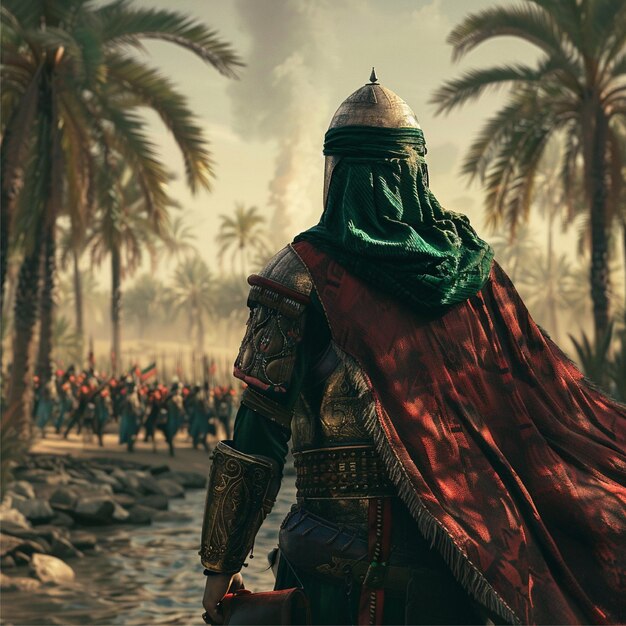THE ELOQUENT HERO

In the Name of Allāh.
As reported, five men from the tribe of Hāshim strikingly resembled the Prophet (ﷺ) that they were often mistaken for him. These people are As-Saib Ibn Ubayd; the fourth grandfather of Imām Ash-Shāfi’ī, Al-Ḥasan Ibn ‘Alī; the grandson of the Prophet (ﷺ) who resembled him most of all, Abū Sufyān Ibn Al-Ḥārith, Qutham Ibn Al-‘Abbās, and Ja’far Ibn Abī Ṭālib; whom are all the cousins of the Prophet (ﷺ).
Let’s learn about the life and legacy of Ja’far Ibn Abī Ṭālib (Raḍiyallāhu ‘Anhu), a hero of Islām, a towering figure in its early days, a champion of the faith, and a shining example of piety, courage, and generosity.
Ja’far (Raḍiyallāhu ‘Anhu) was born in Makkah as the third son of Abī Ṭālib Ibn AbdulMuṭṭalib, and thus a brother to ‘Alī Ibn Abī Ṭālib (Raḍiyallāhu ‘Anhu). He and his wife were among the first persons to accept Islām through Abū Bakr (Raḍiyallāhu ‘Anhu), and he quickly became known for his courage, his intelligence, and his unwavering devotion to the Cause of Allāh.
When the Quraysh made life unbearable for the Muslims, the Prophet (ﷺ) allowed some Muslims to migrate to Abyssinia, which included Ja’far. Ja’far was so eloquent in speech. He gained the opportunity to be appointed as the Muslims’ spokesman in the court of Negus when the news reached Abyssinia that some people had taken asylum in their land. Negus, who was a Christian king at that time became impressed and eager to hear more about Islām.
Ja’far (Raḍiyallāhu ‘Anhu) at the court of Negus, while presenting Islām to him, said: “O King! We were ignorant and immoral people, worshipping idols, eating carrion, committing all sorts of abomination and shameful deeds, breaking the ties of kinship, treating guests badly and the strong exploited the weak. We remained in this state until Allāh sent us a Messenger (Muḥammad), one of our people whose lineage, truthfulness, trustworthiness, and integrity were already well-known to us. He called us to worship God Alone… He commanded us to speak the truth, to honor our promises, to be kind to our relations, to be helpful to our neighbors, to cease all forbidden acts, to abstain from bloodshed, to avoid obscenities and false witness…” [Excerpted from Men and Women Around The Messenger by Sa’d Yusuf]
Ja’far, with his rich and melodious voice, recited the Qur’ān, and the king was moved to tears. Impressively, the Negus eventually accepted Islām, though secretly.
Another interesting thing about Ja’far was his generosity; so generous that he was nicknamed ‘Father of the Poor’ or ‘Father of the Helpless.’
As Allāh willed, Ja’far attained Martyrdom at the Battle of Mu’tah in the eighth year of Hijrah, when the Prophet (ﷺ) mobilized an army to defy Byzantine forces in Syria as one of his emissaries had been killed by a Byzantine governor. It was also in this Battle that Zayd Ibn Ḥārith and ‘Abdullāh Ibn Rawāhah fell (Raḍiyallāhu ‘Anhuma).
From his birth in Makkah to his steadfast faith and eloquence in Abyssinia, to his martyrdom in the Battle of Mutah, Ja’far (Raḍiyallāhu ‘Anhu) lived a life of service to Allāh, of devotion to the Prophet (ﷺ), and of kindness to the poor and the needy. Let’s strive to emulate his example, walk the path of righteousness, live lives of service, of piety, of unwavering faith, and seek the Pleasure of Allāh.
I beseech Allah to be Especially Merciful to Ja’far Ibn Abī Ṭālib. Aameen
Picture Credit: Freepik



